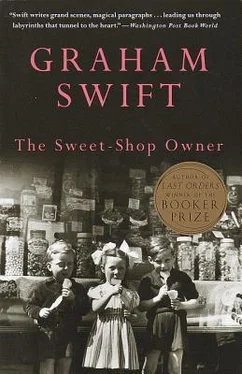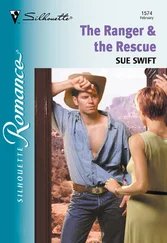Graham Swift - The Sweet-Shop Owner
Здесь есть возможность читать онлайн «Graham Swift - The Sweet-Shop Owner» весь текст электронной книги совершенно бесплатно (целиком полную версию без сокращений). В некоторых случаях можно слушать аудио, скачать через торрент в формате fb2 и присутствует краткое содержание. Год выпуска: 2012, Издательство: Vintage Books USA, Жанр: Современная проза, на английском языке. Описание произведения, (предисловие) а так же отзывы посетителей доступны на портале библиотеки ЛибКат.
- Название:The Sweet-Shop Owner
- Автор:
- Издательство:Vintage Books USA
- Жанр:
- Год:2012
- ISBN:нет данных
- Рейтинг книги:4 / 5. Голосов: 1
-
Избранное:Добавить в избранное
- Отзывы:
-
Ваша оценка:
- 80
- 1
- 2
- 3
- 4
- 5
The Sweet-Shop Owner: краткое содержание, описание и аннотация
Предлагаем к чтению аннотацию, описание, краткое содержание или предисловие (зависит от того, что написал сам автор книги «The Sweet-Shop Owner»). Если вы не нашли необходимую информацию о книге — напишите в комментариях, мы постараемся отыскать её.
The Sweet-Shop Owner — читать онлайн бесплатно полную книгу (весь текст) целиком
Ниже представлен текст книги, разбитый по страницам. Система сохранения места последней прочитанной страницы, позволяет с удобством читать онлайн бесплатно книгу «The Sweet-Shop Owner», без необходимости каждый раз заново искать на чём Вы остановились. Поставьте закладку, и сможете в любой момент перейти на страницу, на которой закончили чтение.
Интервал:
Закладка:
He showed her the stock room, his system of stock lists and how to use the till and scales.
She bent closer with little blinks and nods, as if being admitted to intimate secrets.
‘Well, if you’ve nothing further to ask, perhaps I can give you a lift home. I expect you’ve a husband and family to look after.’
‘Family yes, husband no. I’ve divorced my husband,’ she said deliberately.
‘Oh,’ he said, withdrawing tactfully.
But she went on: ‘Yes — some time ago now. I’m left with his kids of course. I call them “his” because I wouldn’t own to them myself. Is that your car then?’ She nodded towards the Morris, just visible from the Briar Street window.
She brushed more specks from her skirt and looked up, satisfied by the confusion in his face and the expression of sympathy, which she waved aside.
‘Not to worry, Mr Chapman. I’ll get by.’
She crossed her legs, sitting on the wooden stool. Her nylons made slithering noises.
In the car she motioned to him to pull up at the corner of a road in which lights were already lit in the tunnel-like entrances of a squat block of flats.
‘Here’ll do, Mr Chapman, thanks very much. I wouldn’t take you out of your way. You go on to —?’
‘Oh — Leigh Drive.’
‘Leigh Drive. Oh yes, that’s nice, up there. Well —’ she said, struggling to get her knees, her handbag and a laden shopping basket from between the seat and the door-frame, ‘quarter to nine, Monday morning — I’ll be there.’ And so she was, on the dot, and always so, faithfully, tirelessly, for sixteen years — he never imagined she would become a permanent fixture — the fair hair growing crisp and grey, horn-rim glasses encircling the eyes, the neck growing gaunter, ever working and straining to lift the bony face, like some creature peering from its cage to see what it was missing.
She stooped at the car door as he leant over to pull it shut and gave a commiserating look: ‘I do hope Mrs Chapman gets better, Mr Chapman.’
But Mrs Chapman didn’t. No. How many times did he drive to Doctor Field’s to collect the prescriptions for isoprenaline, and thence to Knight’s or Simpson’s to have them made up? There were laurel bushes and a rowan tree by the doctor’s front path and when he entered the waiting-room the faces looked up, some with recognition, from copies of Punch and Life that came from his shop. How many times to the allergist for injections? And how many times to the gloomy hallways of the Chest Department at St Helen’s, to see Doctor Cunningham? The corridors smelt of carbolic and laundered sheets, and he sat in the out-patients’ cafeteria, sipping tea and reading the sombre notices on the wall. ‘Give Blood’, ‘Drink Milk’. She would come out through the swing doors, afterwards, to join him. How sure she looked, how undaunted, appearing behind the glass, not like a sick woman at all. Sitting down at the table, she’d shrug at the inquiring glance he gave her: ‘Oh, nothing. They can do nothing — why don’t they say so and be done with it?’ And gulping the tea he brought her, she’d look at her watch and say, ‘Well, let’s be off — you better be back to work.’ Yet once she said, coming out from her check-up — ‘He wants a word with you — in his office — I don’t know why.’ And she looked at him sharply as he got up, as if he might betray her.
‘These tablets and inhalers don’t cure a thing — you realize that?’
Doctor Cunningham, tall, smooth-faced, strong-jawed, with the wholesome expression of a young, intelligent schoolmaster or games instructor, leant back, holding a fountain pen.
‘They merely alleviate the attacks. I’m afraid we need to know more, Mr Chapman.’
‘More?’
There were papers and files scattered over his desk, which he scanned as if about to make a friendly reprimand on a student’s report.
‘Your wife’s condition seems to have worsened steadily since the birth of your daughter — that’s to say in the last nine years.’
‘Yes.’
‘And before that, since, at least, the end of the war, little aggravation. Intermittent, comparatively mild attacks.’
He looked up quickly from his record sheets as if in need of corroboration.
‘Yes.’
‘And a history of migraine … Cast your mind back, Mr Chapman.’ He suddenly put down his fountain pen and stroked his chin. ‘Would you say there has been — with your wife that’s to say — any pattern of emotional distress?’
‘Pattern?’ He stiffened, remembering her glance.
‘Anything perhaps — please be frank — in your own relations with your wife?’
The office was warm, comfortable, with a maroon carpet and a gas fire surrounded by glossy brown tiles; but outside the view of the hospital — tall windows, fire-escapes, the black pipes of a boiler-house — lay flat and frozen in a dead November light as if projected on a screen.
The close-shaven face smiled sympathetically.
‘For instance — do you know much about your wife before she met you? Does she ever speak of that period?’
Over the gas fire was a wooden mantelpiece, and on one corner, just above Doctor Cunningham’s head, a silver cup on which he just made out the words ‘ … Seven-a-Side Competition 195 …’
‘No, not a lot.’
‘You’re sure of that?’ The doctor raised his eyes a fraction and glanced at one of his buff files. Then he looked up again and half grinned, as if at his own formality.
‘Don’t think I’m grilling you, Mr Chapman. These questions do have a point.’ He leant forward with his arms on the desk. ‘You see, we know very little about asthma, but when there’s no definite physical cause there’s very often an emotional factor. Your wife’s a remarkable woman, Mr Chapman: unusually calm, unusually patient as far as her physical symptoms go; unusually — if you’ll forgive me — unco-operative when it comes to investigating a cure. That’s why I ask you these questions. They’re in your wife’s best interest.’
He had picked up his fountain pen and held it horizontally between his hands.
He wanted to say: ‘How do you know what is in Irene’s best interest?’
‘Do think over the things I’ve asked you, Mr Chapman. And do, please, talk it over with your wife. A lot might depend — I get this impression from her — on the sort of help you’re able to give her.’ He put down the fountain pen and one of the hands pulled back the cuff from the other to expose a wrist-watch. ‘Then perhaps we can have another little chat.’ He got up. ‘You know, there are times when your wife almost seems not to want to get better. We can’t have that. I gather you and Doctor Field had some difficulty in persuading her to attend here. But unless we can be clearer about the cause, her condition’s unlikely to get any easier.’
The smooth face eyed him as if it might be withholding some vital piece of information — or as if he were.
And had he persuaded her to attend so that other people would determine the pattern, decide her interests? So that she would be cured and possess the thing it already pleased her to renounce? Restored to him: the bargain broken?
And she had given him, in her place, Dorothy.
‘Goodbye Mr Chapman.’
A plume of steam released itself from the boiler-house, like a white hole in the flat vista. Outside in the corridor a girl was being pushed along in a wheel-chair while a nurse walked beside her reading a clip-board chart.
In the car, looking forward, her handbag on her knees, she said as they drove back:
‘Don’t talk to the doctor again, Willy.’
No, she did not get better. How many more visits to Doctor Cunningham? Though he never spoke again, true to her command, to that suave-voiced man with his files and sheets of notes. Nor was he asked. She made sure of that. ‘They can do nothing, Willy.’ Another drug, another test; and each time her looks affirmed in advance what would be the result: no change. In between her attacks her breath wheezed continuously, her voice fluttered and rattled. Bouts of bronchitis. A scarf round her neck even in warm weather. And that face slowly being worn away; the cheeks hollow and drained from sleeplessness, the mouth stretched from the effort of breathing. Only the eyes remained, ashy-blue and steady, as if they watched in some mirror the dismantling of her other features and approved the process. As if, if she could have done so, she would have torn off that thin mask of loveliness at the very beginning. For that was never the real thing.
Читать дальшеИнтервал:
Закладка:
Похожие книги на «The Sweet-Shop Owner»
Представляем Вашему вниманию похожие книги на «The Sweet-Shop Owner» списком для выбора. Мы отобрали схожую по названию и смыслу литературу в надежде предоставить читателям больше вариантов отыскать новые, интересные, ещё непрочитанные произведения.
Обсуждение, отзывы о книге «The Sweet-Shop Owner» и просто собственные мнения читателей. Оставьте ваши комментарии, напишите, что Вы думаете о произведении, его смысле или главных героях. Укажите что конкретно понравилось, а что нет, и почему Вы так считаете.












